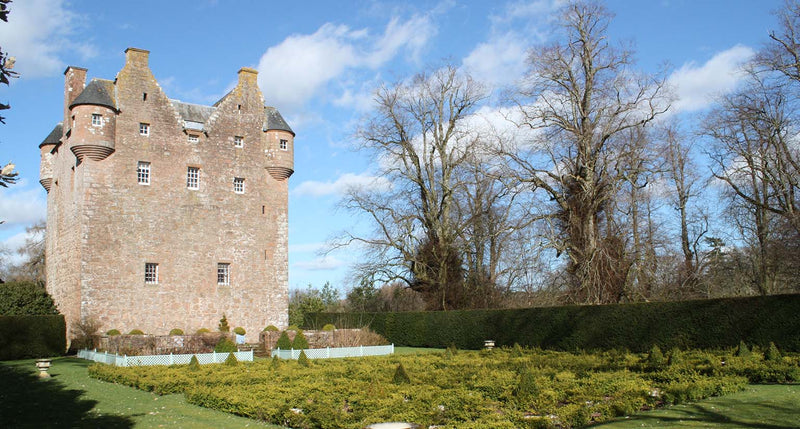The French word ‘jardin’ means ‘garden’ or ‘orchard’ so its presumed that the family originally from France may have lived nearby one or other. Members of the du Jardon family traveled over with William during the Norman conquests in 1066. Records of the name don’t appear in Scotland though until around 1153, the name Wmfredus […]
Tag Archives: Jardine Clan History
The French word ‘jardin’ means ‘garden’ or ‘orchard’ so its presumed that the family originally from France may have lived nearby one or other. Members of the du Jardon family traveled over with William during the Norman conquests in 1066. Records of the name don’t appear in Scotland though until around 1153, the name Wmfredus de Jardin appearing on several charters. Later around 1178 Humphrey de Jardin’s name appears on a charter drawn up by Robert the Bruce.
At some point the name, or at least its meaning appears to have been translated into English; Patrick de Gardinus was chaplain to the Bishop of Glasgow and there is a signature on a document from 1245 of Sir Humphrey de Gardino. To add to the confusion Jorden del Orchard’s signature appears on the notorious Ragman Roll.
Around the fourteenth century Jardines appear to have settled at Applegirth in Dumfriesshire. There they built Spedlings Tower, the family’s base until the seventeenth century when Jardine Hall was built on the opposite banks of the Annan. The move was forced due to a grizzly family secret; A millar had been left to starve to death in the dungeon of the tower and his ghost had driven the family from it’s home.
The border regions between Scotland and England was a difficult place to settle, with constant raids and other incursions by both sides. Sir Alexander Jardine of Applegirth met an advancing English force near Carlisle in 1524 taking hundred’s prisoner. Years later in 1547 the tables were turned on his son when he had to deal with over 5,000 English who overran the area, sacking the Jardine lands and forcing John Jardine if Applegirth to yield. John later sought assistance from the French and along with the Jardines fell on their English oppressors taking many lives in revenge.
The Jardines supported the cause of Mary, Queen of Scots but her scandalous marriage to Bothwell after the suspicious murder of Lord Darnley turned the Jardine’s, like so many other Scots to support her infant son James’ claim to the throne.
A later Sir Alexander Jardine forged a link to the powerful Douglas clan through marriage to Lady Margaret Douglas, sister of the first Duke of Queensberry. They had a son in 1645 who was later created a Baronet of Nova Scotia.
The fourth Baronet was a Knight of the Sovereign Order of Malta, taking a vow of celibacy. When he died in 1790 the title passed to his brother, Sir William.
The Jardines have an interesting connection with the new world. Frank Jardine, who’s father had worked in the colonial service in Australia married a Samoan Princess, Princess Sana in 1873. Using his connections he was able to develop north-east Australia and the state of Queensland. The estates where he settle were called ‘Lockerbie’ in memory of his ancestral home
Dr William Jardine began a business partnership with James Matheson. Due in no small part to the effect that the opium wars had in strengthening the British presence the house of Jardine Matheson became a dominant force in Far East trade
Jardines also made their mark on the literary world. Reverend John Jardine, born in 1716 mixed in the intellectual heart of Edinburgh during the Scottish Enlightenment had the good fortune to be part of a society that included great Scots such as economist and writer Adam Smith, Philosopher David Hume and the painter Allan Ramsay. He was one of the founders of The Edinburgh Review. His son, Sir Henry Jardine, was one of those present when the ‘Honours of Scotland’ were re-discovered in 1818. He was knighted in 1825 and later made a Fellow of the Royal Society of Edinburgh.
Sir William Jardine, 13th Baronet and 24th Chief, born in 1984, is active in promoting clan activities and is a member of the Standing Council of Scottish Chiefs.

